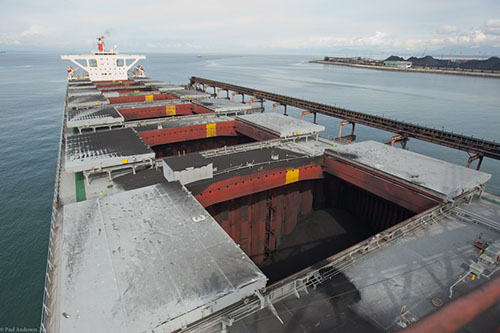— from Michael Riordan —
(Reprinted in part with permission of Seattle Times)
 The state Department of Ecology will soon make an important permitting decision that could well pit Washington state against the federal government. The proposed Millennium Bulk Terminal-Longview project must obtain a Clean Water Act Section 401 permit from the state before construction could begin, certifying that it will not significantly impact state and tribal waters. A denial of this permit would fly directly in the face of Trump administration efforts to resuscitate the dying coal-mining industry in attempting to assert U.S. “energy dominance.”
The state Department of Ecology will soon make an important permitting decision that could well pit Washington state against the federal government. The proposed Millennium Bulk Terminal-Longview project must obtain a Clean Water Act Section 401 permit from the state before construction could begin, certifying that it will not significantly impact state and tribal waters. A denial of this permit would fly directly in the face of Trump administration efforts to resuscitate the dying coal-mining industry in attempting to assert U.S. “energy dominance.”
[perfectpullquote align=”right” cite=”” link=”” color=”#778899″ class=”” size=””]The state Department of Ecology should take a firm stand on behalf of sound science and deny the permit for this unpopular, poorly conceived coal terminal.[/perfectpullquote]
This is the one Pacific Northwest coal-terminal project still standing from the original six proposed early in the decade. If built, it could export up to 44 million metric tons annually of Powder River Basin coal mined in Montana and Wyoming. Proponents tout the thousand or so temporary construction jobs and 135 permanent jobs the project would generate, plus annual millions in tax revenues. If the terminal is not built, mining companies will have to continue shipping coal by rail through the state to Westshore Terminals near Vancouver, B.C.
This low-grade thermal coal, burned principally by utilities, is particularly dusty, resulting in “fugitive” coal dust polluting local environments if not properly contained during transport and shipment. Project proponents claim this will not be a serious problem due to mitigation measures to be enacted. But a critical examination of calculations involved in estimating these coal-dust emissions at the planned terminal, which I presented in three comments on the draft environmental-impact statements and the Section 401 permit application, show that these estimates are extremely low, by factors of up to 7, mainly because of very optimistic assumptions used in the analyses.
READ MORE: www.seattletimes.com/opinion/say-no-to-longview-coal-terminal/
**If you are reading theOrcasonian for free, thank your fellow islanders. If you would like to support theOrcasonian CLICK HERE to set your modestly-priced, voluntary subscription. Otherwise, no worries; we’re happy to share with you.**







